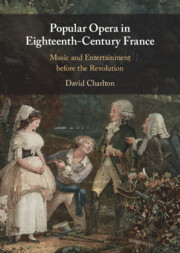
- Publisher:
- Cambridge University Press
- Online publication date:
- December 2021
- Print publication year:
- 2021
- Online ISBN:
- 9781009026734
- Subjects:
- Seventeenth-Century Music, Music, Opera

This is the first book for a century to explore the development of French opera with spoken dialogue from its beginnings. Musical comedy in this form came in different styles and formed a distinct genre of opera, whose history has been obscured by neglect. Its songs were performed in private homes, where operas themselves were also given. The subject-matter was far wider in scope than is normally thought, with news stories and political themes finding their way onto the popular stage. In this book, David Charlton describes the comedic and musical nature of eighteenth-century popular French opera, considering topics such as Gherardi's theatre, Fair Theatre and the 'musico-dramatic art' created in the mid-eighteenth century. Performance practices, singers, audience experiences and theatre staging are included, as well as a pioneering account of the formation of a core of 'canonical' popular works.
‘Ultimately, Popular Opera is a towering intellectual achievement that stands to significantly reorient contemporary accounts of eighteenth-century French opera. Charlton paves the way for a history of this repertoire in which previously discounted genres like fairground comedy and operatic parody take their place alongside the tragédie en musique. In this monograph, popular opera truly receives the limelight it has long deserved.’
Callum Blackmore Source: Journal for Eighteenth-Century Studies
‘Charlton’s erudite scholarship makes Popular opera an essential reference work for musicologists, performers and scholars of 18th-century theatre. Moreover, Charlton’s lucid descriptions of the often complex plots in many of these works highlight various news stories and themes relevant to the cultural and political historian. This much needed volume not only fulfils Charlton’s initial observation that ‘Popular opera deserves a history’ (p.1) but amply demonstrates that this hitherto neglected repertory is sophisticated enough to rival even the tragédie en musique.’
Adrian Powney Source: Early Music Journal
‘… an extremely important monograph for any historian of opera and music theatre, which should be considered a towering achievement.’
Erin Helyard Source: Musicology Australia
‘Ultimately, David Charlton's study calls for a reassessment of the impact of popular genres on the history of music more widely. This is its greatest contribution: 'Popular Opera' opens up new research perspectives by bringing together genres that are often neglected, or sometimes considered less important - such as fairground comedy, vaudevilles and operatic parody - with more widely studied and accepted genres such as the opéra-comique or the tragédie lyrique.’
Maxime Margollé Source: Eighteenth-Century Music
 Loading metrics...
Loading metrics...
* Views captured on Cambridge Core between #date#. This data will be updated every 24 hours.
Usage data cannot currently be displayed.